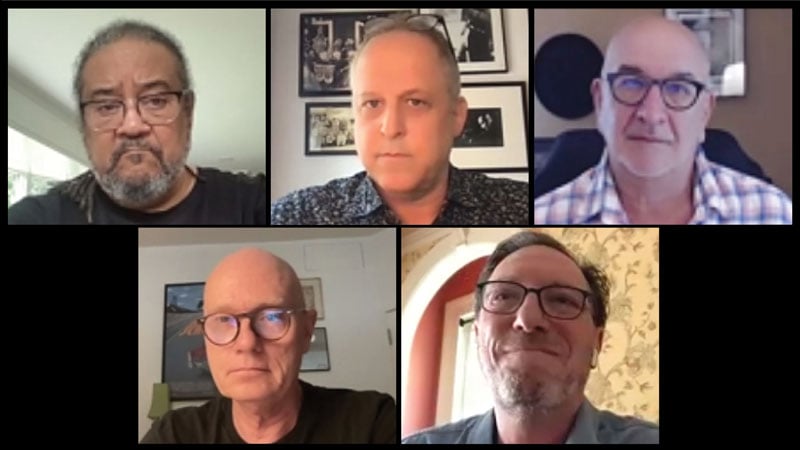On July 8, the Eastern Region Special Projects Committee hosted the online event, Establishing Shots: Transitioning from DP to Director. In a discussion moderated by Director Michael Slovis, Directors Ernest Dickerson, Russell Lee Fine, Jean de Segonzac and David Tuttman engaged in an entertaining and informative conversation about how and why they made the move into the Director’s Chair from their previous positions as Directors of Photography, and discussed the challenges of taking on their new roles and revealed the essential elements involved in forming a successful partnership between a Director and a DP.
After an introduction from Special Projects Committee member Daniel Hank, Slovis opened the panel with a discussion of what projects the panelists first directed.
Fine recalled how he started his directing career on the series White Collar. “I negotiated for two episodes while I was the series DP. Time comes around for my first episode, and the show looked cool, but I knew that the expectation was that my episode was going to look good, and they knew that I couldn’t just do an average episode. I had to do an episode that was one of our best.”
Dickerson stressed the importance of listening to actors. “Hearing somebody else’s input and different ideas is always fascinating because they might come up with ideas you never even thought of and sometimes come up with really great stuff. I’m a strong believer in that old saying that ‘90% of directing is casting.’ When you have a great cast who know their characters, it’s just amazing because the most fun to me is being the first audience of seeing a show happen.”
Segonzac revealed his experience in learning how to fight for a scene. “In the beginning, those were the things that I was very timid and wouldn’t speak much. I would feel in my gut that it wasn’t working, but would I have the courage to come in and wrestle the beast and make it work? Now, I don’t have a problem with coming in and wrestling the scene or the story into a shape that I feel is going to work.”
Tuttman shared his memories of how he found success while directing his first episode. “The support of the crew means a lot. The types of leaders we are, we walked into a situation having a crew that did want to help us succeed, and actors who knew us and were ultimately pleased to see our growth. In jumping in, without a doubt, the acceleration of thinking and questions and the level of preparation that I felt necessary was a big emotional and intellectual juice of sorts. I did go into that first episode really nervous, but also feeling a lot of support. That made a lot of difference.”
See videos from this event in the gallery below.
ABOUT THE PANELISTS:
 Ernest Dickerson Ernest DickersonDickerson’s directorial credits include the features Juice, Surviving the Game, Tales from the Crypt: Demon Knight, Never Die Alone, Double Play; and episodes of The Wire, The Walking Dead, Treme, Dexter, Heroes, Raised by Wolves, DMZ, Interrogation, Bosch, The Man in The High Castle, House of Cards, Seven Seconds and Godfather of Harlem. His DP credits include features such as John Sayles’ The Brother from Another Planet and multiple collaborations with Spike Lee including She’s Gotta Have It, School Daze, Do the Right Thing, Mo’ Better Blues and Malcolm X. Dickerson joined the DGA in 1992 and is also a member of the American Society of Cinematographers. |
 Russell Fine Russell FineFine’s directorial credits include the pilot and episodes of Kaleidescope and Graceland; and multiple episodes of series including For Life, Sleepy Hollow, Quantico, Hemlock Grove and American Gods. His cinematographer, credits include features such as Cindy Sherman’s cult classic Office Killer and Godfrey Reggio’s Naqoyqatsi; as well as series including The Wire, Luck and The Black Donnellys, where he received an ASC award nomination. Fine has been a DGA member since 2010. |
 Jean de Segonzac Jean de Segonzacde Segonzac’s directorial credits feature over two hundred episodes of television including shows such as Oz, Battlestar Galactica, CSI, Gossip Girls, Damages, The Americans, Nashville, Bloodline, Manifest, Blindspot, Homicide: Life on the Streets and many shows produced by Dick Wolf. His DP credits include documentaries such as Rob Epstein & Jeffrey Friedman's Common Threads: Stories from the Quilt, Roger Weisberg's Can't Afford to Grow Old, Thomas Lee Wright's Eight-Tray Gangster: The Making of a Crip and episodes of American Masters, Nova and Homicide: Life on the Streets. de Segonzac joined the DGA in 1995. |
 David Tuttman David TuttmanTuttman’s directorial credits include episodes of series such as Damages, Blindspot, The Following, The Enemy Within, Prodigal Son and The Endgame. His cinematographer, credits include episodes of most of the above titles as well as Wu-Tang: An American Saga, Wild Card, Royal Pains, Three Rivers, Gossip Girl and Law & Order. Tuttman has been a DGA member since 2010. |
 Michael Slovis (moderator) Michael Slovis (moderator)Slovis’s directorial credits include the feature, Spirit; and episodes of Breaking Bad, CSI, Chicago Fire, Law & Order: SVU, 30 Rock, Elementary, Game of Thrones, Better Call Saul, Preacher, New Amsterdam, The Walking Dead and The Calling. His cinematographer, credits include features such as Daisy von Scherler Mayer’s Party Girl and Michael Oblowitz's The Foreigner. He is a six-time Emmy nominee for his photography on Breaking Bad and one time won an Emmy Award for his 2006 CSI: Crime Scene Investigation episode "Gum Drops." Slovis has been a DGA member since 2003. |
About The Special Projects Committee
Special Projects is the educational and cultural arm of the Directors Guild of America, providing its members opportunities for creative exchange to advance their craft and celebrate the achievements of directors and their teams.






